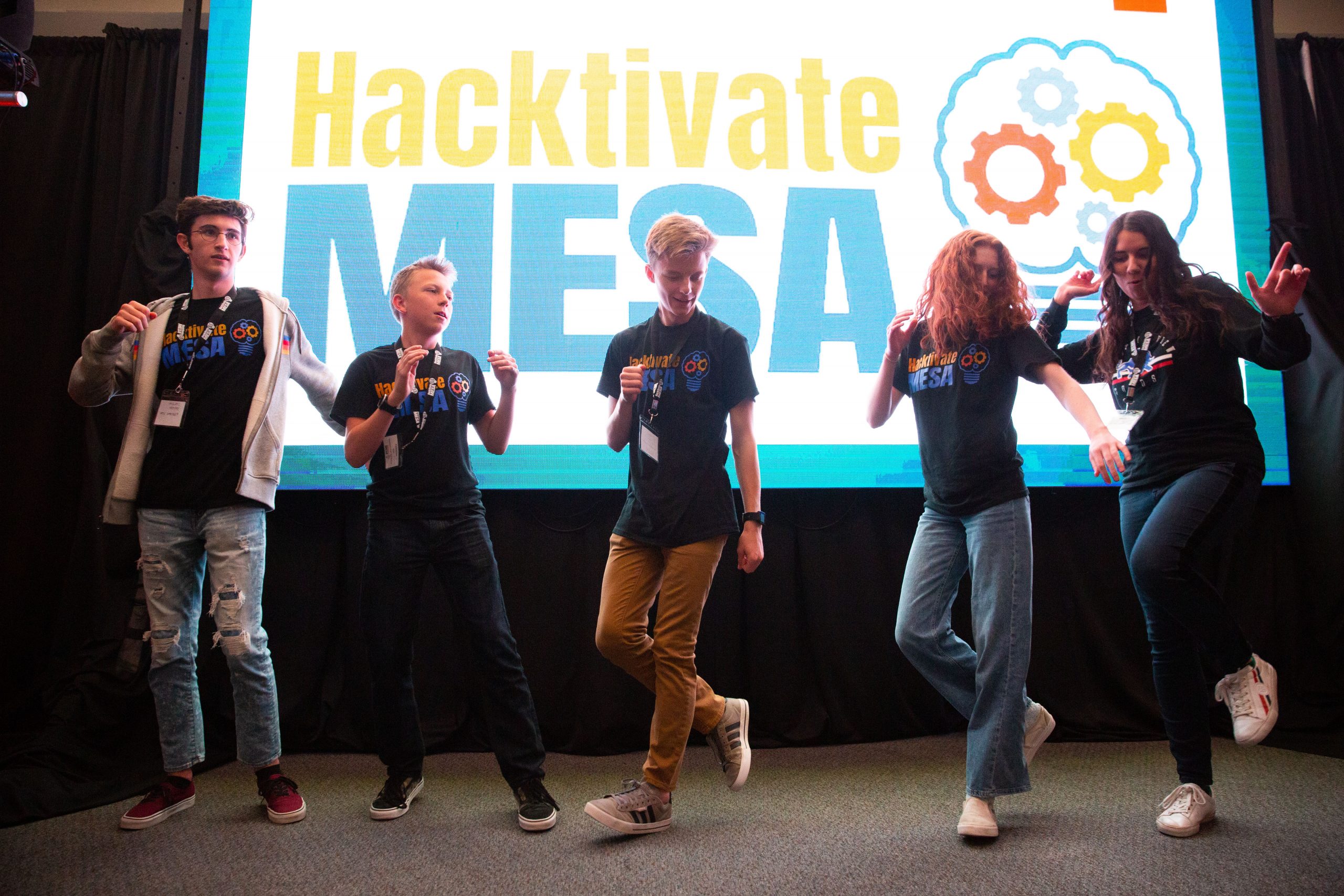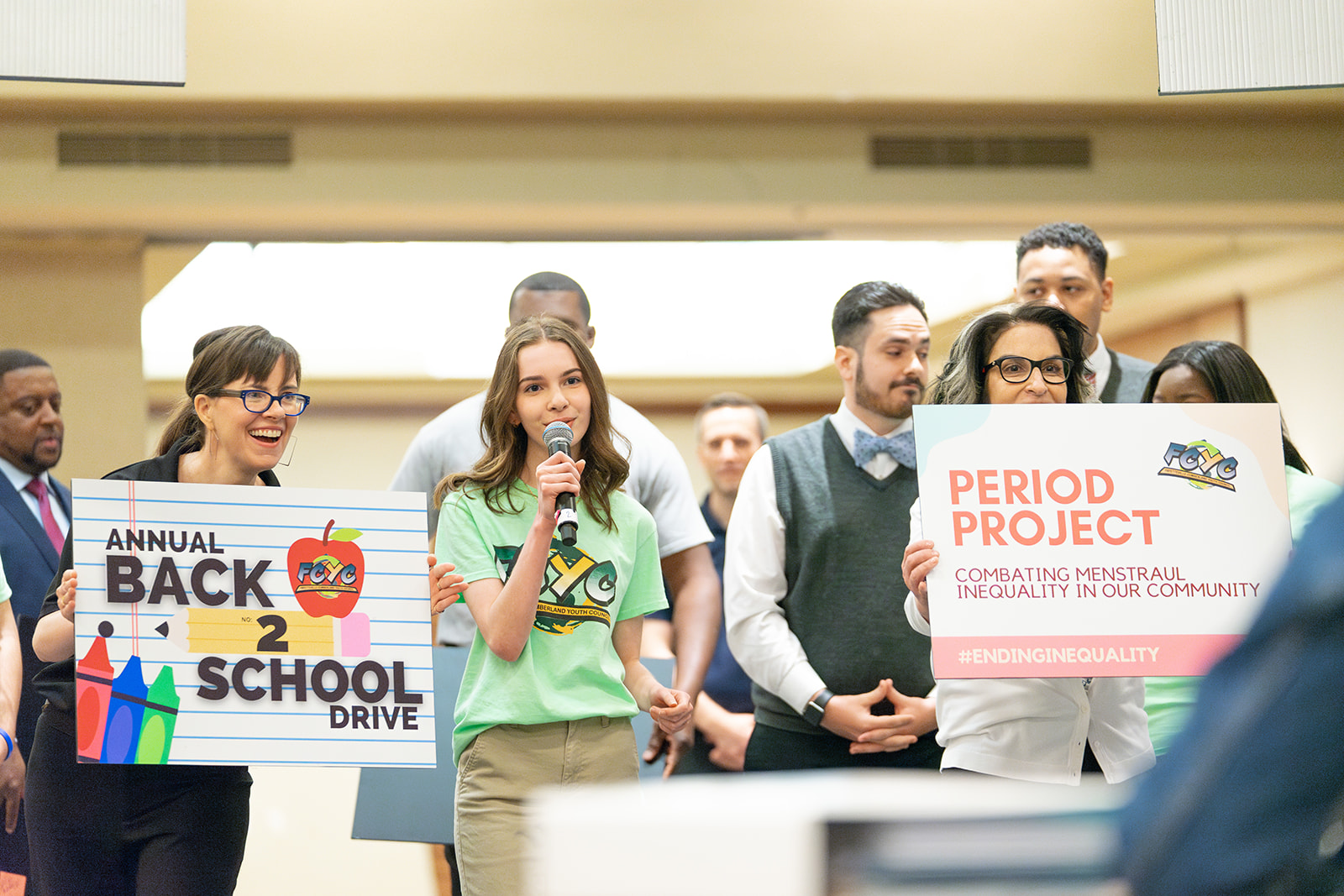By Rebecca Trout
This September, I attended The Kettering Foundation’s inaugural Emerging Issues Conference, a day-long event that brought together participants from around the world. Panelists discussed the seemingly global creep towards authoritarianism and discussed possible innovations and interventions to slow or stop the gradual wearing down of democratic norms. One panelist, Yelena Litvinov from STROIKA, a grassroots, anti-authoritarian organization, made a comment that stuck with me. She pointed out the troubling parallels between Russia’s descent into authoritarianism and warning signs we’re witnessing in the United States, but also noted how examples of resistance can give hope. Her remarks reminded me of the 2023 All-America City Award recipients, and how their stories of community success offer inspiration and perhaps even the beginnings of a blueprint for strengthening civic life and democracy.
Democracy works best when all members of communities are active and engaged in the policies and decisions that shape their lives, including, and perhaps especially, youth. The 2023 awards identified communities that are breaking down barriers to meaningful youth participation and enacting programs that are improving quality of life.
Efforts highlighted by the communities ranged from increasing youth voice in decision-making processes to meaningfully engaging youth to address issues such as mental health, public safety, homelessness, and college and career readiness. These promising practices from the 2023 award winners can’t erase the growing threat of authoritarianism here and around the world, but they do show how small acts undertaken collaboratively can foster democracy as they chip away at today’s challenges.
While all the winning communities focused on youth engagement, a few trends and sub-themes emerged during the June 2023 event.
- Promoting Youth Voice in Decision-Making
- Volunteering and Community Service
- Addressing Mental Health
- Creating Safe Communities
Promoting Youth Voice in Decision-Making
Hactivate Mesa
Mesa, Arizona uses data and youth ideas to find novel solutions to entrenched community challenges. Hactivate Mesa was created to celebrate youth ideas and encourage collaboration with professionals to increase civic engagement and elicit the exploration of careers in civil service. The collaborative event brings students together to study and analyze data on pertinent topics or problems in their community to help promote data science, STEM, critical thinking, problem solving, presentation skills, community pride, and civic engagement.
“We recognize that generational differences can impact our community. Active and engaged youth are a source of government innovation and improved service. They can provide fresh approaches, create positive impact, and ensure that outcomes are responsive to their concerns.”
-Councilmember Julie Spilsbury
Initially designed as an annual 2-day event for high school students, Hacktivate Mesa now includes activities throughout the year for students in 8th grade to master’s candidates at Arizona’s three public universities.
During Hacktivate Mesa, students use actual city data to identify patterns and trends about a community issue and make recommendations for addressing it. To promote inclusiveness and understanding of equity, the projects always include data on community demographics and areas of disparate impact.
The city has leveraged youth insights into actual programs. The 2022 Hacktivate presentations informed initiatives that helped shape ongoing efforts, such as centralized homeless resources/services, crisis intervention training for School Resource Officers, and a food waste into gas program.
Dallas Youth Commission
Dallas, Texas gives youth leaders a meaningful platform to share their voice and insights with policymakers. Since its inception, the Dallas Youth Commission has spearheaded various initiatives and made change in the community through youth forums, community service events, crime prevention programs, an anti-smoking ordinance, and a youth resources guide. The commission has also focused on increasing student voter registration and turnout in local and national elections.
During Dallas’ 2023 AAC presentation, the vice chair of the youth commission said that she was proud of the commission’s great work, but not finished.
“We are looking to expand our teen focus initiatives and are connecting with teens in new ways such as the All Teens Everywhere podcast where we discuss pressing issues, such as higher education and gun violence.”
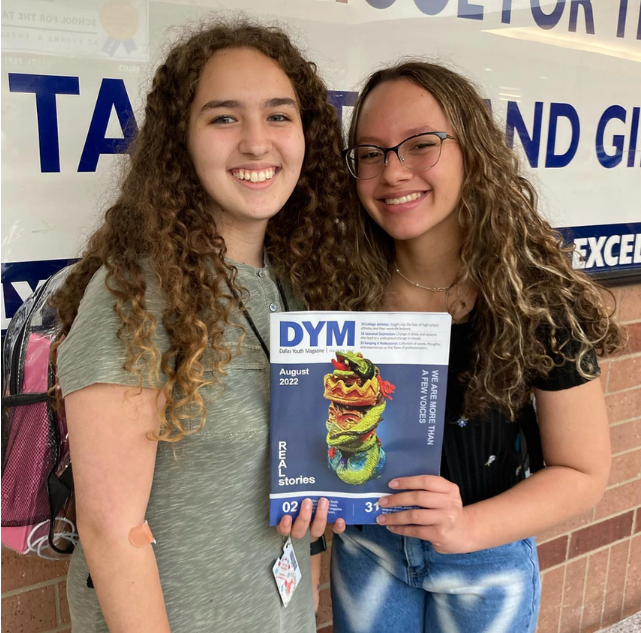 Another platform for youth voice is the Dallas Youth Magazine, which elevates the perspectives and voices of Dallas youth and inspires them to become more involved and engaged with their community and local government. The youth magazine serves as an outlet for students throughout the Dallas-Fort Worth area to contribute and express their opinions, as well as hone their creative skills. Since its release, the magazine has been distributed to over 40,000 high school students.
Another platform for youth voice is the Dallas Youth Magazine, which elevates the perspectives and voices of Dallas youth and inspires them to become more involved and engaged with their community and local government. The youth magazine serves as an outlet for students throughout the Dallas-Fort Worth area to contribute and express their opinions, as well as hone their creative skills. Since its release, the magazine has been distributed to over 40,000 high school students.
The youth commission even hosts Town Halls for Teens to bring young people together to discuss issues that directly affect them. Local elected officials attend and answer questions about areas of concern, such as police and youth relations, social media and professionalism, and voter registration.
Decatur Youth Council
Community engagement is the norm in Decatur, Georgia, and residents are encouraged to get involved from a young age. The Decatur Youth Council (DYC) was established in 2016 to provide opportunities for high school-aged youth to learn more about local government and to encourage them to participate in the city’s decision-making processes. DYC members are the voice of the adolescent population and assist with implementing the recommendations of various city-wide plans. Youth now have a permanent seat at the table of every planning process conducted in Decatur and are frequently called on to research and make recommendations to the city commission.
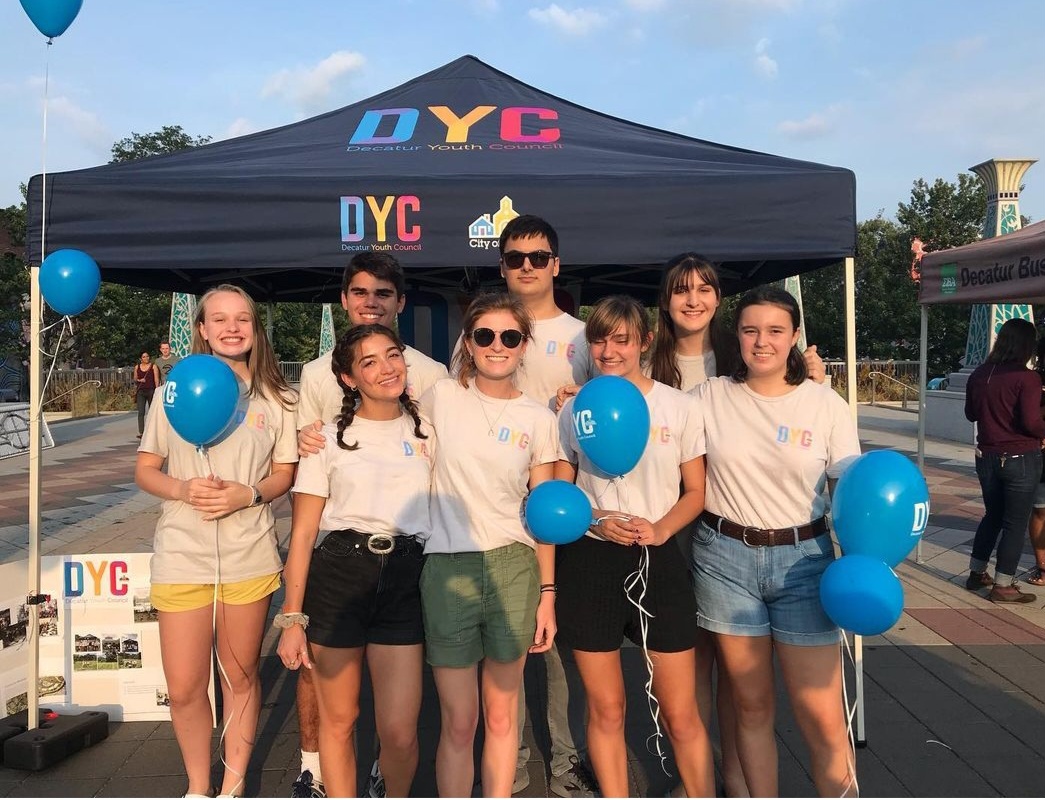 The DYC routinely contributes to the community in a variety of ways. One recent example was a special concert on the square that they hosted featuring homegrown youth bands. Along with providing a fun, youth-oriented family event, they found a way to introduce attendees to city commissioners in an engaging and approachable way. The DYC interviewed all five commissioners, asking questions such as, “If you had a superpower, what would it be? How do you spend your spare time?” and other questions designed to get to know elected officials in a way that is relevant to youth. They used the information to create oversized information boards with photos of each commissioner and excerpts from their interviews. The boards were displayed during the concert and then moved to a large window in the Decatur Public Works Building where the community can see and read them as they walk or bicycle to school and work.
The DYC routinely contributes to the community in a variety of ways. One recent example was a special concert on the square that they hosted featuring homegrown youth bands. Along with providing a fun, youth-oriented family event, they found a way to introduce attendees to city commissioners in an engaging and approachable way. The DYC interviewed all five commissioners, asking questions such as, “If you had a superpower, what would it be? How do you spend your spare time?” and other questions designed to get to know elected officials in a way that is relevant to youth. They used the information to create oversized information boards with photos of each commissioner and excerpts from their interviews. The boards were displayed during the concert and then moved to a large window in the Decatur Public Works Building where the community can see and read them as they walk or bicycle to school and work.
Volunteering and Community Service
Fayetteville Youth Service Projects
Fayetteville, North Carolina youth gain leadership opportunities at the local, state, and national level. The Fayetteville-Cumberland Youth Council (FCYC) provides an avenue for youth to develop leadership skills while implementing innovative service projects. Each year, FCYC develops and implements a variety of innovative service projects that help the community.
FCYC’s Period Project was recognized as the 2022 North Carolina State Youth Council’s Most Creative/Innovative Project. With this project, the FCYC Community Outreach Committee led efforts to collect women’s menstrual products and distributed the donations to schools and organizations throughout the school year. The goal was to help students gain access to menstrual hygiene tools and education.
The youth council also promotes kindness through anti-bullying campaigns in area high schools and community-wide clean-up events.
Service projects are largely funded by proceeds from the annual Glow Fest, a 5k run/walk and concert.
Davie County Surfs
In Davie County, North Carolina, youth-prioritized and -led projects are funded by a youth grantmaking body. After conducting a needs assessment, the Davie Community Foundation (DCF) found that youth issues, such as substance misuse and drop-out rates, were a major concern in Davie County. To address this, DCF established a Youth in Philanthropy program in 2005, which empowers youth to address youth-related issues and provides them with training to develop leadership skills.
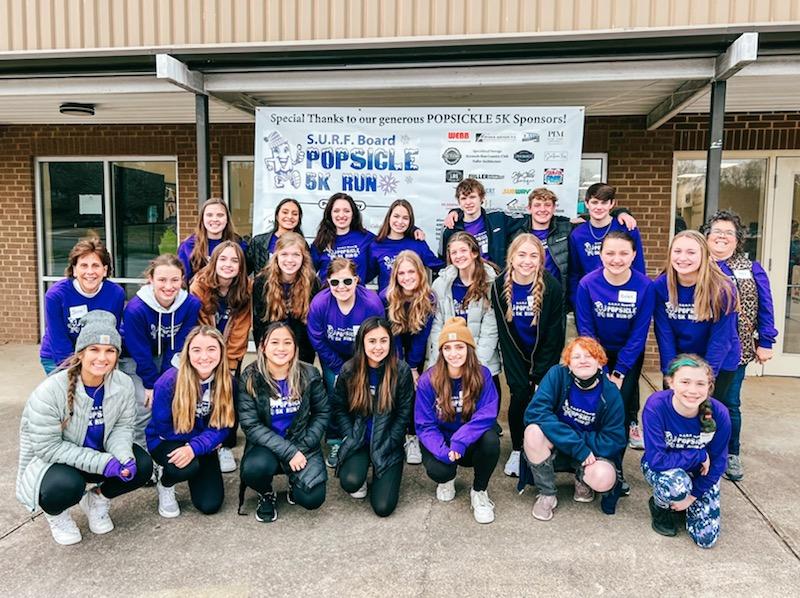 The program led to the establishment of S.U.R.F. (Student Understanding Real Futures) Board Youth Grantmakers, to grant funds for youth-led projects. S.U.R.F. members plan an annual retreat, a fundraising event, and discuss ideas for projects that address youth needs. The POPSICLE 5K, hosted by S.U.R.F., has become the largest fundraising effort, raising between $8,000 and $14,000 for grant awards annually.
The program led to the establishment of S.U.R.F. (Student Understanding Real Futures) Board Youth Grantmakers, to grant funds for youth-led projects. S.U.R.F. members plan an annual retreat, a fundraising event, and discuss ideas for projects that address youth needs. The POPSICLE 5K, hosted by S.U.R.F., has become the largest fundraising effort, raising between $8,000 and $14,000 for grant awards annually.
Grant-funded projects have addressed issues such as poverty, hunger, technology needs, youth workforce development, placemaking, and racism.
One of the members of the S.U.R.F. Board had this to say about his experience:
“SURF has taught me valuable lessons in networking and establishing relationships. My communication and leadership skills have grown, and I now understand the value of philanthropy — the giving of my time, talent, and treasure.”
Addressing Mental Health
Gonzales Youth Supporting Youth
Youth in Gonzales, California, have been the driving force of addressing mental health needs in their community. The Gonzales Youth Council (GYC) engages youth in civic life through projects and direct participation in city government and decision-making. Each year, the youth commissioners participate in a paid four-week summer fellowship program, receiving leadership training, working with city and school leaders, and gaining an understanding of internal city workings. They become participatory members of the city council, attending meetings, and making recommendations and presentations on behalf of the GYC.
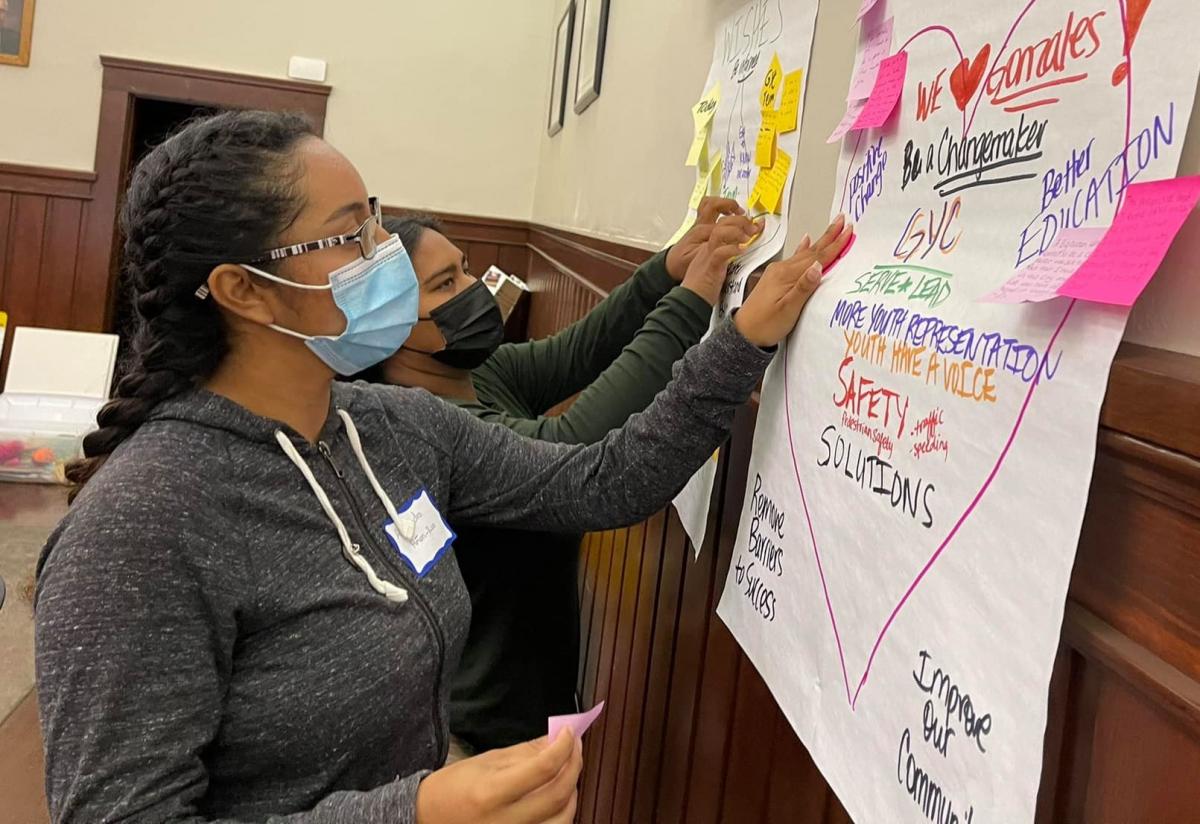 The GYC selects an annual service-learning project based on current community concerns. During the COVID-19 pandemic, the GYC decided to tackle the issue of youth mental health. The Youth Supporting Youth project began with the development of a mental health and social-emotional well-being survey for 355 middle and high school students. The survey revealed elevated levels of anxiety symptoms and stress. When asked if they knew where to access mental health support, most respondents said “no” and explained that they had no idea where or how to seek out those services, adding to the gravity of the issue and validating the call for more readily available local mental health resources and support.
The GYC selects an annual service-learning project based on current community concerns. During the COVID-19 pandemic, the GYC decided to tackle the issue of youth mental health. The Youth Supporting Youth project began with the development of a mental health and social-emotional well-being survey for 355 middle and high school students. The survey revealed elevated levels of anxiety symptoms and stress. When asked if they knew where to access mental health support, most respondents said “no” and explained that they had no idea where or how to seek out those services, adding to the gravity of the issue and validating the call for more readily available local mental health resources and support.
The GYC created a mental health awareness video and continued outreach and education via email and social media to support their peers, outlining tips for how teachers and families could provide support. The youth commissioners also presented their survey findings to various stakeholders, resulting in the funding of a second school-based licensed clinical social worker.
Mount Pleasant- Weaving Light into Dark
The dual epidemic of suicide and substance misuse has impacted the youth of Mount Pleasant, South Carolina, and therefore the fabric of the community.
Creighton Shipman died of a substance misuse disorder following an addiction to legally prescribed opioids. The tragedy spurred Creighton’s family to action:
“During our darkest hour, we began to see our community rally around us and support us. Our family then decided we were going to shine a bright light on opioid use disorder. We made a promise to Creighton that we would share our story and we would bring real changes into the community. WakeUP Carolina was then founded.”
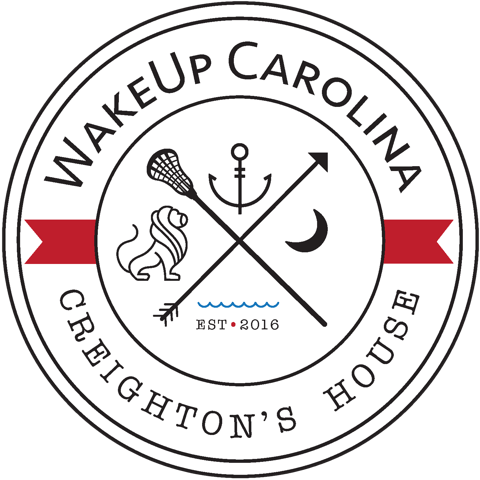 WakeUp Carolina works to empower young people, individuals, and families battling substance misuse. WakeUp Carolina offers support groups for those coping with opioid substance misuse disorder and their families, as well as recovery coaching programs.
WakeUp Carolina works to empower young people, individuals, and families battling substance misuse. WakeUp Carolina offers support groups for those coping with opioid substance misuse disorder and their families, as well as recovery coaching programs.
WakeUp Carolina—in partnership with the police department, mayor, and youth council—also hosted the Our Community, Our Children symposium, which kicked off a very uncomfortable but necessary discussion on improving mental health and trauma systems for local youth. The symposium was the catalyst for several cooperative initiatives, including efforts to create a multi-disciplined response team for both mental health and drug misuse. The response team will be comprised of a member of the Mount Pleasant Police Department, the Mount Pleasant Fire Department, a member of WakeUp Carolina, and a mental health clinician. This team of professionals will be deployed using a comprehensive and multifaceted approach to addressing the mental health and substance misuse crisis.
Creating Safe Communities
Charlotte’s Youth Diversion Program
Charlotte, North Carolina, has found creative ways to keep the community safe while diverting youth from the criminal justice system. The Charlotte-Mecklenburg Police Department (CMPD) created and implemented the Youth Diversion Program in response to disproportionate minority contacts with the police, and the school-to-prison pipeline. The pre-arrest diversion program breaks the cycle of youth justice system involvement and mitigates an arrest record for youth who commit first time misdemeanor offenses.
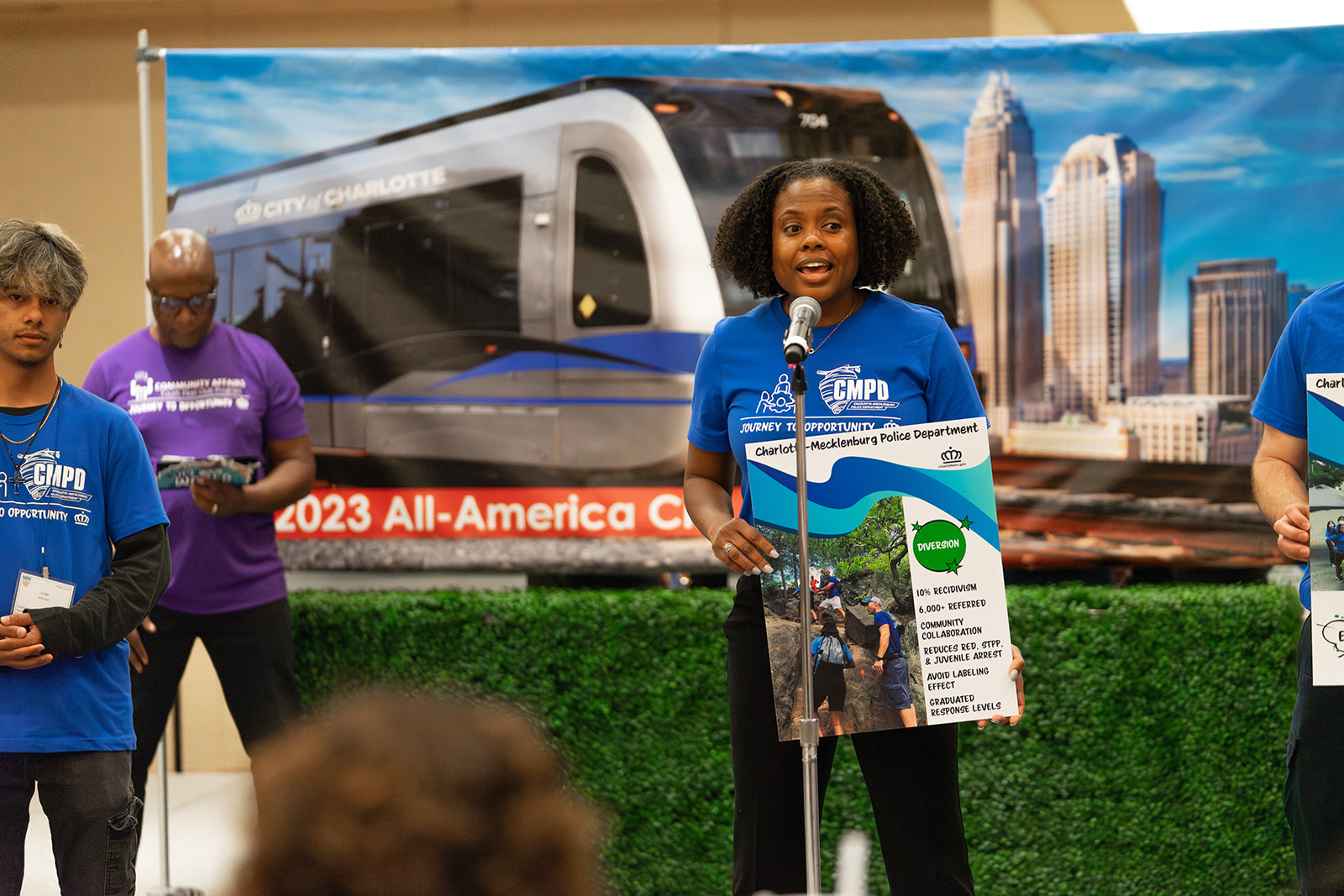 The Youth Diversion program affords local youth the opportunity to participate in and successfully complete the program as an alternative to criminal prosecution. Diversion opportunities maintain accountability for delinquent acts while providing the appropriate support to redirect behavior. Youth participate in up to eight hours of interpersonal skills workshops designed to address specific areas of concern such as decision-making, risk taking, goal setting, conflict resolution, academic achievement, and substance abuse. Parents and guardians also participate in a two-hour workshop designed to assist them in understanding and redirecting their child’s behavior.
The Youth Diversion program affords local youth the opportunity to participate in and successfully complete the program as an alternative to criminal prosecution. Diversion opportunities maintain accountability for delinquent acts while providing the appropriate support to redirect behavior. Youth participate in up to eight hours of interpersonal skills workshops designed to address specific areas of concern such as decision-making, risk taking, goal setting, conflict resolution, academic achievement, and substance abuse. Parents and guardians also participate in a two-hour workshop designed to assist them in understanding and redirecting their child’s behavior.
Since the program’s inception in 2012, juvenile arrests have decreased by 46%, racial and ethnic disparities have decreased by 45%, and 90% of participating youth do not reoffend.
CMPD also offers the REACH (Respect, Engage, Accountability, Character, and Honesty) Academy, a complementary program that provides leadership opportunities and educational seminars for younger individuals who show potentially early signs of trouble but have not yet committed any crimes. The program promotes positive behaviors and has been successful in maintaining positive relationships between police officers and youth in the Charlotte area.
Public Safety in Hampton
Hampton, Virginia, takes a community-wide approach to public safety. Mayor Donnie Tuck joined the Hampton delegation at the 2023 All-America City Award event and had this to say about his administration’s approach to public safety:
“When Hampton received federal recovery money, I committed to dedicating a minimum of 5% of those dollars to engaging our young people in violence prevention. Just helping our young people survive isn’t enough, we’re helping them thrive!”
The Hampton Police Department’s community policing strategy relies on working with diverse partners to create initiatives that open communication and understanding with members of the community, especially those who live in neighborhoods disproportionately affected by gun violence. School Resource Officers (SROs) are just one example of many community partners.
Hampton’s SROs provide classroom instruction on topics such as being a good citizen, personal safety, bullying, and gangs. SROs also serve as mentors and resources to students before and after school.
SROs also play a critical role in Keep the Peace, an after-school, court-mandated program in which police help keep students from being incarcerated by helping them grasp the long-term consequences of poor choices and recognize how to make better decisions.
Young men, and those identifying as men, can also take advantage of Boys II Men, a program designed to provide a space for students without a father figure in the home to ask questions and participate in positive male interactions. Participants can earn field trips, such as trips to the movies or sporting events.
Lastly, a new after-school program in a low-income middle school is a partnership between the police and the non-profit Hampton Roads Police Athletic League. SROs and other officers interact with students after school to provide enriching opportunities to develop positive relationships between youth and law enforcement. Educational, athletic, and recreational activities promote socio-emotional development and create trust and understanding.
Measured Hopefulness
An engaged citizenry is one sign of a healthy democracy and whether it be addressing community safety, mental health, or youth opportunity, the 2023 All-America City Award recipients show us what is possible when the full complement of a community’s assets are harnessed and directed towards a shared vision for the future. I offer these examples not to rebut the narrative that democracy is in trouble, but to highlight the hopeful subplot of promising local actions that are impacting lives and strengthening systems. Simply recounting and patting these communities on the back isn’t sufficient; we must find a way to bottle the enthusiasm, maintain the momentum, and scale and spread these promising practices to strengthen democracy more broadly.
The National Civic League will continue identifying threats to local democracy and educating communities on ways to address these threats through our webinar series, journal articles, and the 2024 All-America City Award, which has a theme of ‘Strengthening Democracy through Local Action and Innovation.’
Rebecca Trout is Director, Washington, DC, Office and All-America City Award Program
